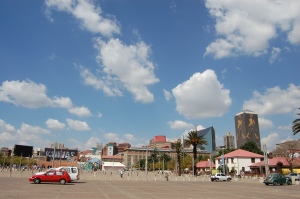Jo’burg Orientation
 Interviews. It’s a staple of journalism my classmates and I have been practicing since orientation week began for us on Monday. The past two days have been a whirlwind of tours, meetings and talks with various media and political organizations in Johannesburg, a sort of crash course in South African institutions.
Interviews. It’s a staple of journalism my classmates and I have been practicing since orientation week began for us on Monday. The past two days have been a whirlwind of tours, meetings and talks with various media and political organizations in Johannesburg, a sort of crash course in South African institutions.
Orientation week was organized by Medill and Fray Intermedia, a press association that trains journalists in South Africa. Our guide Elvis and journalist Michael Schmidt have graciously introduced us to hospital representatives, spokesmen for the ruling political party, head of the South African public broadcaster, the editor of the oldest newspaper in South Africa (older than the WSJ!) and other fascinating individuals involved in South Africa’s development.
We visited two hospitals this week. One hospital was focused on HIV/AIDS research and the other was a clinic working with TB and HIV/AIDS patients. During one of the visits, we got a tour of the clinic. People sat in rows and rows of chairs, waiting in line for test results, treatment and counseling. I couldn’t help but wonder how many of these patients will die of HIV/AIDS. If we go by statistics, one in every five people who were in that very hospital had HIV and without adequate medical treatment, will die of AIDS complications. Walking through the hospital wards and seeing the faces of these people really humanized this often faceless and underreported disease.
The doctors discussed the complex nature of the HIV/AIDS epidemic in South Africa. While there are condoms and antiretrovirals widely available because of government, PEPFAR and USAID funding, there is such an overwhelming stigma attached to the disease that people are afraid to get tested and treated. Other factors, such as traditional healers and churches can be a problem when they advocate herbs and a faith-cures-all attitude instead of life-saving drugs. These hospitals are hoping to change that by educating traditional healers and church leaders and making them a part of the solution in destigmatizing AIDS.
 During the past few days, we also visited the South African Broadcasting Corporation, the nation’s public broadcaster. This news organization used to be a state broadcaster during apartheid and has been criticized as being a mouthpiece for the ruling party, both before and after apartheid. Things seem to have improved though. While SABC’s board members are appointed by the president, the TV and radio broadcaster gets only 2 percent of its funding from the government and SABC’s editorial independence is enshrined in the South African constitution. Although I’m still not sure how independent SABC really is, it was interesting to hear how Africa’s leading news organization is expanding its operations and trying to become a voice in the world for South Africans.
During the past few days, we also visited the South African Broadcasting Corporation, the nation’s public broadcaster. This news organization used to be a state broadcaster during apartheid and has been criticized as being a mouthpiece for the ruling party, both before and after apartheid. Things seem to have improved though. While SABC’s board members are appointed by the president, the TV and radio broadcaster gets only 2 percent of its funding from the government and SABC’s editorial independence is enshrined in the South African constitution. Although I’m still not sure how independent SABC really is, it was interesting to hear how Africa’s leading news organization is expanding its operations and trying to become a voice in the world for South Africans.
Today, we met with two African National Congress spokesmen. Founded just under a century ago, ANC is the ruling party of South Africa today. It has huge political clout in a nation that has largely a one party system. It’s predicted in every single poll that the ANC will win the presidential election on April 22, three weeks from now. While it’ll be a shoe-in for the ANC, no one knows by what margin the ANC will win and whether they will lose their two-thirds majority in government necessary for real political power.
It seems many South Africans have become disillusioned by the ANC. Promises made when the party was elected in 1994, such as running water and electricity for all, have yet to bear fruit. Corruption scandals have rocked the party countless times in the last 15 years and it doesn’t help that the leading ANC contender for the presidency is facing corruption charges. During this global economic crisis, many South Africans are getting skittish. A new breakaway party called Congress of the People has been formed in opposition of the ANC. Another politcal party called Democratic Alliance is surging in the polls in the Cape Town region. The ANC is losing its foothold in provinces such as Limpopo and Free State. There is a lot of pressure on the ANC, and being journalists, I think we seized the opportunity to ask some tough questions. Why is the ANC supporting Jacob Zuma when one if its platforms is fighting corruption? What is South Africa doing about the burgeoning healthcare costs and services? What is ANC plan after the election?
Throughout the past few days, not all of our questions were answered adequately. Representatives skirted and simplified issues. We often ran out of time because of our tight schedule. However, I believe we’re slowly getting a feel for and understanding of the complex developmental issues that surround South Africa today. It’s been quite a learning experience so far.
– 30 –
Leave a comment